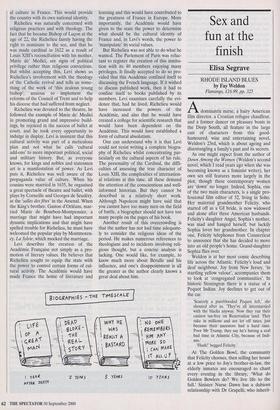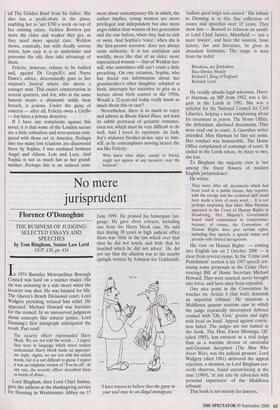Sex and fun at the finish
Elisa S egrave RHODE ISLAND BLUES by Fay Weldon Flamingo, £16.99, pp. 325 Adominatrix nurse, a hairy American film director, a Croatian refugee chauffeur, and a former dancer on pleasure boats in the Deep South, all feature in the large cast of characters from this good- humoured, wise and entertaining novel, Weldon's 23rd, which is about ageing and disentangling a family's past and its secrets.
As one might expect from the author of Down Among the Women (Weldon's second novel, which I read years ago when she was becoming known as a feminist writer), her own sex still features more largely in the plot, though these contemporary women are 'down' no longer. Indeed, Sophia, one of the two main characters, is a single pro- fessional film editor of 32, living in Soho. Her maternal grandmother Felicity, who started off as a GI bride, is now widowed and alone after three American husbands. Felicity's daughter Angel, Sophia's mother, was mad and hanged herself, but luckily Sophia loves her grandmother. In chapter one, Felicity telephones from Connecticut to announce that she has decided to move into an old people's home. Grand-daughter Sophia flies over.
Weldon is at her most comic describing life across the Atlantic. Felicity's loud and deaf neighbour, Joy from New Jersey, 'in startling yellow velour', accompanies them to look at 'congregated communities'. In historic Stonington there is a statue of a Pequot Indian. Joy declines to get out of the car.
`Scarcely a pureblooded Pequot left,' she shouted after us. 'They've all intermarried with the blacks anyway. Now they run their casinos tax-free on Reservation land. They rake in millions and are let off taxes, just because their ancestors had a hard time. Poor Mr Trump, they say he's having a real bad time in Atlantic City, because of Indi- ans.'
'Hush!' begged Felicity.'
At The Golden Bowl, the community that Felicity chooses, then selling her house at a low price to Joy's brother-in-law, the elderly inmates are encouraged to chant every evening in the library, 'What do Golden Bowlers do? We live life to the full.' Sinister Nurse Dawn has a dubious relationship with Dr Grapelli, who inherit- ed The Golden Bowl from his father. She also has a profit-share in the place, enabling her to 'net $700 a week on top of her existing salary. Golden Bowlers pay more the older and weaker they get, as they need more special care. Weldon shows, comically, but with deadly serious intent, how easy it is to undermine and patronise the old, then take advantage of them.
Felicity, however, refuses to be bullied and, against Dr Grapelli's and Nurse Dawn's advice, determinedly goes to her stepson's funeral where she meets a younger man. This causes consternation in several quarters, and Joy, who at the same funeral wears a diamante teddy bear brooch, is jealous. Under the guise of concern — after all, Felicity owns a Utrillo — Joy hires a private detective.
If I have any complaints against this novel, it is that some of the London scenes are a little colourless and over-serious com- pared with those set in America. Perhaps also too many lost relations are discovered there by Sophia. I was confused between Angel and Alison, Lois and Lucy. And Sophia is not as much fun as her grand- mother. Perhaps this is an indirect cam- ment about contemporary life in which, the author implies, young women are more privileged and independent but also more angst-ridden than women of her generation and the one before, when they had to sink or swim. And Sophia's 'voice', when she is the first-person narrator, does not always seem authentic. It is too confident and worldly, more like that of an older, more experienced woman — that of Weldon her- self, who sometimes still can't resist a little preaching. On one occasion, Sophia, who has found out information about her grandmother's other daughter, adopted at birth, interrupts her narrative to give us a lecture about birth control in the 1950s. Would a 32-year-old today really know so much about this or care?
Nevertheless, there is so much to enjoy and admire in Rhode Island Blues, not least its subtle portrayal of geriatric romance, even sex, which must be very difficult to do well. And I loved its optimism. As Jack, Joy's widower brother-in-law says to him- self, as he contemplates moving nearer the sea like Felicity:
Who knew what ships, enemy or friend, might not appear at any moment, over the horizon?



























































































 Previous page
Previous page